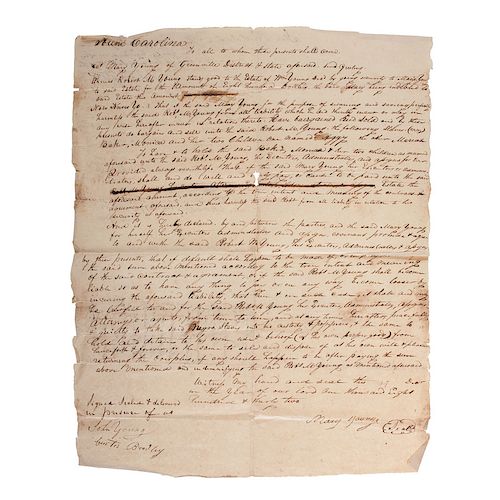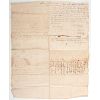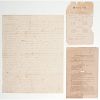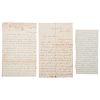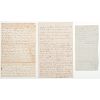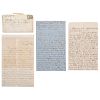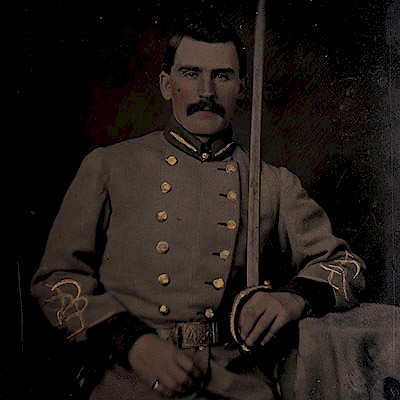CSA General Pierce Manning Butler Young & Family Manuscript Collection
About Seller
6270 Este Ave.
Cincinnati , OH 45232
United States
With offices in Cincinnati, Cleveland and Denver, Cowan’s holds over 40 auctions each year, with annual sales exceeding $16M. We reach buyers around the globe, and take pride in our reputation for integrity, customer service and great results. A full-service house, Cowan’s Auctions specializes in Am...Read more
Two ways to bid:
- Leave a max absentee bid and the platform will bid on your behalf up to your maximum bid during the live auction.
- Bid live during the auction and your bids will be submitted real-time to the auctioneer.
Bid Increments
| Price | Bid Increment |
|---|---|
| $0 | $25 |
| $500 | $50 |
| $1,000 | $100 |
| $2,000 | $250 |
| $5,000 | $500 |
| $10,000 | $1,000 |
| $20,000 | $2,500 |
| $50,000 | $5,000 |
| $100,000 | $10,000 |
About Auction
Jun 22, 2018
Cowan’s American History: Premier Auction, scheduled for June 22, 2018 is comprised of early photographs, documents, manuscripts, broadsides, flags, and more dating from the Revolutionary War, the Civil War, Late Indian Wars, World War I and II and beyond. Cowan's Auctions dawnie@cowans.com
- Lot Description
Lot of 22 war-date letters, 1 slave sale agreement, and 2 war-date Confederate documents. Archive relates to the prominent Young family of Bartow County, GA, which sent three sons to fight for the Confederacy including Confederate General Pierce Manning Butler Young. The majority of the documents date to 1864, a year in which heavy fighting moved increasingly closer to the Young family and their properties. Content is rich and varied, touching upon military matters, family and civilian life in a war zone, POWs, and more. Altogether, this is an outstanding collection which presents a fascinating and intimate view of a prominent Confederate family.
Pierce Manning Butler Young (1836-1896) was a Confederate war hero, politician, and diplomat, and is credited with being the youngest Major General to serve in the Confederate Army. He was born to Dr. Robert Maxwell Young and Elizabeth Caroline Jones in Spartanburg, SC. His grandfather was a captain in the Continental Army during the Revolutionary War, and his father was a prominent doctor and planter. Sometime between 1839 and 1840, Dr. Robert Young moved his family from South Carolina to Bartow County, GA. Here Pierce Young was raised on the family plantation known as "Walnut Grove." As a young teenager P. M. B. Young entered the Georgia Military Institute, and in 1857 he received an appointment to the United States Military Academy. Unlike his roommate and friend George Armstrong Custer who graduated from West Point in 1861, Young did not complete his courses at the Academy. Rather, after Georgia's secession from the Union, Young opted to return home to Georgia just months before his scheduled graduation. After serving nearly the entirety of the war, Young served as a four-term US Congressman from Georgia, a diplomat to the Imperial Russian Court, and as US Minister to Guatemala and Honduras. In 1896 he died in New York City on his way home from a post.
During his time in the Confederate army, Pierce Young was noted for his bravery, at one point reportedly saying, "I'll be a major general or in Hell in half an hour." Rapid promotions early in his enlistment saw Young rise to the rank of Lt. Colonel by November 1861. At this time he commanded the cavalry portion of Thomas R.R. Cobb's Georgia Legion. In the following years, Young continued to distinguish himself playing an active role in the Maryland, Gettysburg, Bristoe, Mine's Run, Overland, and Carolinas Campaigns. He was wounded in action three times during his enlistment. In 1863 Young was promoted to brigadier general and in December 1864, after returning home to Georgia to fight Sherman's Army, he attained the rank of major general. It is during the tumultuous year of 1864 that the correspondence in this collection begins.
While encamped near Fredericksburg in February 1864, Young writes to his mother in Cartersville, GA, and warns her that it may be time to flee from the encroaching Union Army. He says, in part, "I think you all had better leave for our army might have to fall back but leave someone to take care of the house for it will be ruined even by our own troops if no one is there to protect it...." Surprisingly, his assessment is not entirely bleak as he continues telling his mother, "I think things are looking brighter now than they have for a long time. You must always look on the bright side. There is not reason now for looking at the dark side..." As the year progressed Young would continue to write his mother and keep her apprised of the situation in the field. On August 30th Young writes to his mother following the Second Battle of Reams' Station at Weldon Railroad, VA: "We had a glorious success several days ago. Hill's Corps and the cavalry together captured twenty five hundred prisoners. We had a pretty brisk little fight. We surprised the enemy and charged his breastworks. For twenty minutes the firing was as severe as any I ever heard...P.M. B. Young." Major General Young also seems to have maintained a close relationship with his sister Louisa Young Jones. In a letter dated October 24, 1864, Young writes to his sister about her plans to stay at her father-in-law's house, and then continues at length about the politics involved with the potential promotion of Matthew Calbraith Butler, a prominent South Carolina citizen who served in Hampton's Legion and later the 2nd South Carolina Cavalry regiment.
General Young's letters to his mother and sister represent a small portion of the archive, as several other Young family members are represented in the collection as well. Pierce Young's older brother CSA Col. Robert Butler Young of the 10th Texas [KIA Franklin, TN, Nov. 30, 1864] writes a letter to his sister Louisa in July 1864 which references his regiment's movements during the Atlanta Campaign. He begins saying "I am delighted to hear that Pierce [wounded at Ashland, Virginia, on June 1, 1864] has arrived safely at home, & that his wounds are doing well. I am exceedingly sorry that it is out of my power at present to go home to see him." He later continues, "General Bragg is now here for what purpose I do not pretend to know. Hope he will let General Johnston along. We are all confident we can whip Sherman whenever he will give us the chance. The army is in fine spirits; and anxiously expecting a fight. Atlanta is being depopulated by the citizens. You need entertain no fear where you are. You are safe." Robert's wife, Josephine Florida Young also features in the collection with a solemn letter of four pages written to her mother-in-law following Robert's departure from leave back into the field. "Will this cruel war with its endless troubles ever cease? ... I have gone through some rather rough waves...I will willingly submit to any privations, hardships, ...if we can only in the end gain our Independence and have my husband spared to return to us..."
Hardship is apparent in the letters of other women in the family as well. By July 1864, the women of the Young family have been displaced from their plantation home "Walnut Grove" in Barstow County, GA. Emma T. Gary, a cousin on Elizabeth Young's side of the family, writes to her cousin Louisa Young Jones on July 10, 1864, stating that "Ma recd a letter from you a few weeks since giving us an account of your sudden flight from your happy home & of the subsequent destruction of your father's elegant residence, but I am happy to hear from Coz Henry farrow that you were mistaken about the houses being destroyed...I felt badly to think that your beautiful flowers nurtured by your own hands, coz. [Elizabeth] Caroline's nice garden, & all of your fathers nice arrangements were destroyed by the polluted hands and vile tread of our degraded enemies but worst of all that you were compelled to leave and seek a home 'amid strangers afar'...." Louisa appears to have removed to the home of her in-laws in Greenville [likely, SC as opposed to Greenville, GA], while her mother has moved east to safety in Penfield, Green County, GA. Writing to her daughter in August 1864, Elizabeth Young shares that she had recently received a letter from Robert: "He is still unhurt & I feel so thankful, the other day he had the crown of his hat shot off of his head is still fighting every day in the trenches near Atlanta says he is well but lives as hard as any poor mortal ever did...." Like so many other women, worry for her loved ones is a constant struggle as she waits on letters and the end of the war. "This horrid War keeps me so excited & unhappy all the time," she writes, "[I] cannot tell what a day may bring....I do trust Sherman will be driven back & we will get home again but I fear it will be some time first....Your father sends his love to you & kiss the children says you must not come home till it is safe...." One month later, Elizabeth writes to her daughter again, detailing the crops, animals, news of Robert and Pierce, and her fears that they will have to move once again. Elizabeth's confidence in the war effort is waning. She writes, "I fear our Army is not sufficient to contend with the enemy then our State will be over run. We are now open to raids. Roberts regiment was one thousand & fifty now it only numbers ninety six. What slaughter it still goes on I fear we will loose all our men or the greater part of them..."
Elizabeth closes her September 1864 letter to her daughter offering her hopes that Louisa's husband, a Union prisoner, will soon be exchanged. Dr. Thomas Foster Jones (1832-1899) and Louisa Young Jones were married in September 1860. Dr. Jones went on to serve as Captain of Co. A., 16th Battery of Partisan Rangers, and was captured and imprisoned at Johnson's Island on the coast of Lake Erie. In a letter of September 28, 1864, Louisa's cousin, James Watts, writes to her that he has news of her husband as he has recently visited Captain John Harris, a former prisoner who was exchanged from Johnson's Island. Watts tells Louisa that Captain Harris "...knows Tom well, when he left him his health was improving & from what I gathered from him, was likely to get clear of the disease with which he has been troubled, he says he is well clothed and comparatively comfortable...and is in one of the best blocks of quarters...." Watts' letter goes on to provide interesting description of how the prisoners pass their time at the prison. Another letter related to Johnson's Island, this from POW Capt. Jeremiah E. Ritch, Co. H, Cobb's Cavalry Legion, is included in the collection. Ritch, who was taken prisoner at Brandy Station after receiving a saber wound in the head, writes to Pierce Young in September 1864 asking for his assistance in securing an exchange: "Capt. Jones [Louisa's husband] and I having become weary of our sojourn here and seeing little prospect of a general exchange have concluded to write you a joint letter soliciting you to exert your influence with the authorities to affect a special exchange...." Ritch continues his letter with a description of the proposed exchange, and shares his dread at the thought of spending another winter in "this rigorous climate." Ritch, who was forced by Federal authorities at Old Capitol Prison to draw straws for execution, was no doubt doubly eager to exit Johnson's Island.
It was not all soldiering for Pierce Young and his fellow soldiers, however, as evidenced by a printed dance invitation from May 1864 and a series of ensuing love letters addressed to Young. The invitation to a "Military Hop" at City Hall in Columbia, SC is dated May 4th, 1864. Significantly, this is the dance where Young is to have met Miss Mary C. Brooks, daughter of Preston Brooks of South Carolina. Miss Brooks and Young form an attachment despite Brooks engagement to another, and Brooks would write to Young often during the remainder of the war. Several of these love letters are included in this collection, and demonstrate that Miss Brooks was clearly besotted with the dashing Pierce Young. She was also distrustful of him, noting in several letters that Pierce is a "flirt" and she fears his affection is insincere. After a period of more than six weeks without hearing from him, Miss Brooks writes on October 5, 1864, that "...I think you are trying me...Gen. Young I believe you did love me in Columbia, but I fear I have disgusted you long since...." Perhaps Miss Brooks was right to be distrustful of General Young. There are included in the collection two additional letters to the General from an unidentified female who, like Miss Brooks, is missing the attention of the General. In one of these letters, the mysterious female friend also shares an anecdote about Young's "friend" General George Custer, who she says left a cork screw for General Young and sent him a gold pencil.
Other interesting documents in the archive include a CSA Scout's letter from Private Rufus B. Merchant, dated April 21, 1864, addressed to General Young concerning the movements of the enemy including "contraband" plunderers. It reads, in part: "Gen. The enemy have moved the greatest number of their force on the Garland ferry road...; a large number of contrabands are now leaving Singleton's house the enemy seem to be preparing to move off. I did not see more than a hundred; nothing more than rear guard I think I saw but four or five mounted men. The contrabands are heavily ladened with plunder....I have been watching them since day light." Also, a June 1864 letter from CSA 1st Lt. C. Campbell, 22nd Georgia Siege Heavy Artillery, written to Young with sympathy in regarding Young's wounding and of his certainty that Young will be promoted.
Three additional documents of note accompany the collection. The first is an 1832 agreement between Pierce Manning Butler's father, Dr. Robert M. Young, and Mary Young, Dr. Robert Young's mother, both of South Carolina. In this agreement Mary Young "does bargain and sell unto the said Robert M. Young the following slaves (viz) Baker, Monica and her two children one named Aggy the other Mariah...." Notations on verso indicate that a John Young witnessed the document signed, sealed, and delivered by Mary Young to Robert Young, and that the within named negroes were sold at Greenville Court House in 1847 for $1,585.00. The second document is a field printed Confederate General Orders No. 92, Charleston, SC, December 30, 1864, regarding the allowance of field transportation for the troops throughout the Department of South Carolina, Georgia and Florida. Finally, a handwritten copy of General Young's farewell address, ca 1864, issued by Young to his command after being ordered to Georgia to help defend the eastern portion of the state during Sherman's March to the Sea, is included in the collection. No doubt influenced greatly by his family's own sufferings, he writes, in small part, "with pride let it be remembered your flag has never trailed in the dust, nor...surrendered to the enemy...buckle on your sabers with renewed hope and energy for the coming contest. Your homes are invaded, your property destroyed. Your cities, towns, and private residences are burned to the ground. Your mothers, wives, sisters & daughters have been insulted and driven from their homes penniless and houseless. No man of honor and courage can submit to such degradation. Let us renew our vows and...we will drive back the invader from our soil and accomplish our independence.”
The Feb 11, 1864, letter is significantly faded, making text difficult to decipher in places. Other letters are in good condition. The Confederate General Orders has a small loss in the mid-section along the fold line, as well as tearing along the vertical fold, with some soil.Condition
Eliminate the Hassle of Third-Party Shippers: Let Cowan's Ship Directly To You!
If you'd like a shipping estimate before the auction, contact Cowan's in-house shipping department at shipping@cowans.com or 513.871.1670 x219. - Shipping Info
-
Buyers are required to pay for all packing, shipping and insurance charges. Overseas duty charges are the responsibility of the successful Bidder. Be aware that for larger and/or valuable items, shipping charges can be substantial. - If there is no shipping amount on listed your invoice, you will need to make arrangements to pick up or ship your purchase through an alternative shipping company. Our shipping department can be contacted at 513.871.1670 (ext. 219) or email shipping@cowans.com. - Shipping charges include insurance for your order while in transit. If you have private insurance we will adjust your charge to include only packing and shipping. - Please allow 14 – 21 days after payment to package and ship your purchase as carefully as possible.
-
- Buyer's Premium



 EUR
EUR CAD
CAD AUD
AUD GBP
GBP MXN
MXN HKD
HKD CNY
CNY MYR
MYR SEK
SEK SGD
SGD CHF
CHF THB
THB